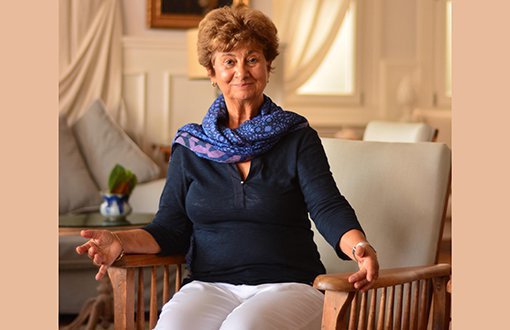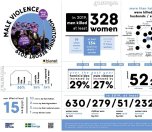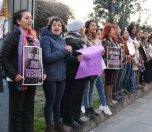Photo: Coşan Göksel
Click to read the article in Turkish
Turkey is experiencing a crisis in terms of women's rights, which has led to a change of form in male violence, where men began "policing" any woman, according to a professor of gender studies.
Contrary to the traditional form of male violence, which was exercised by a close circle of people, such as fathers, brothers or husbands, women have been recently exposed to violence by men in general, Prof. Deniz Kandiyoti told Kısa Dalga Podcast.
"A man gets on a bus, slaps a woman he doesn't know, saying, 'How can you dress like that?' It is a new thing that men try policing [women] and think that nothing will happen to them when they act like that," she remarked.
New forms of violence have emerged after the early gains for women in the Justice and Development Party (AKP) era and another reason for that is the "large gap" between men's means and expectations of control on women, she argued.
"Maybe the woman earns more money, contributes more, but the man wants [her] salary. Then what happens? Violence! To those who say, 'Violence has not increased, it has always been there,' [I say] the form of violence has changed."
Gains in the early AKP era as a 'showcase'
Early gains in the nearly 18-year-long era of the AKP are also being reversed according to Prof. Kandiyoti.
"At the beginning of the AKP era, there were actually big gains," she said, citing the government's efforts in the process of European Union (EU) accession and the changes made in the Civil Law and the Turkish Penal Code in accordance with the EU process.
In an amendment to the Constitution in 2004, the AKP added a paragraph on gender equality to Article 10 titled, "Equality before the law."
In 2011, Turkey became the first signatory state that approved the İstanbul Convention on preventing and combating violence against women and domestic violence in its parliament, with the support of all four parties that were represented at the time.
CLICK - Conservatives Campaign Against İstanbul Convention, Push AKP for Withdrawal
However, bianet's Male Violence Monitoring Reports show a steady increase in the reported cases of feminicides since 2010.
The women's movement had been "used as a showcase" in international relations and had been "intertwined with the state apparatus" for a long time, she noted.
According to Kandiyoti, this ended when President and AKP Chair Recep Tayyip Erdoğan said men and women cannot be equal back when he was the prime minister. In a speech he gave at the Women and Democracy Association (KADEM) in 2014, Erdoğan had said the equality of men and women was "against nature."
"Right now, there is a state of crisis. Because men do not want to give up on the authority they acquired," she said. "In the situations where [women] stand up, they are beaten and killed."
About Deniz KandiyotiDeniz Kandiyoti is an author and an academic of research in the fields of gender relations and developmental politics in the Middle East, specifically Turkey. She is currently a faculty member at the University of London. Kandiyoti worked at Middle East Technical University (METU) between 1969 and 1973 and at Boğaziçi University between 1974 and 1980. She holds a PhD from London School of Economics. She has books titled, "Women and Rural Production Systems", "Women, Islam and the State" and "Gendering the Modern." She was born on March 15, 1944. |
(DB/VK)







